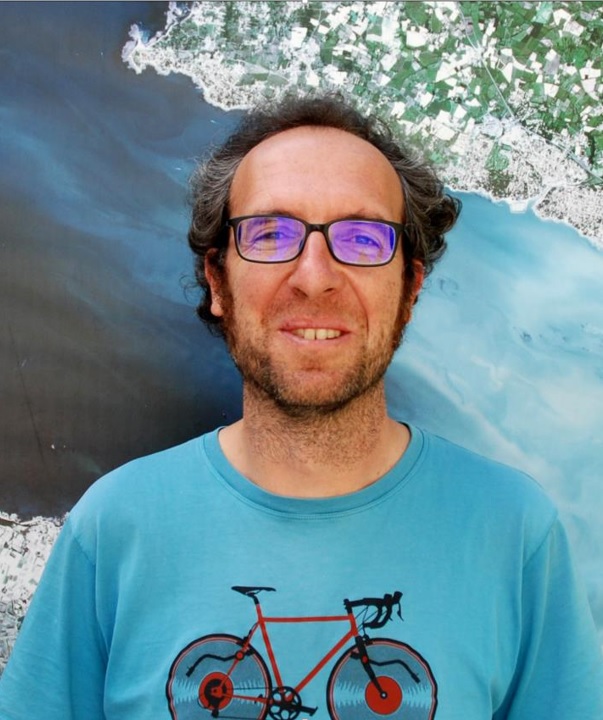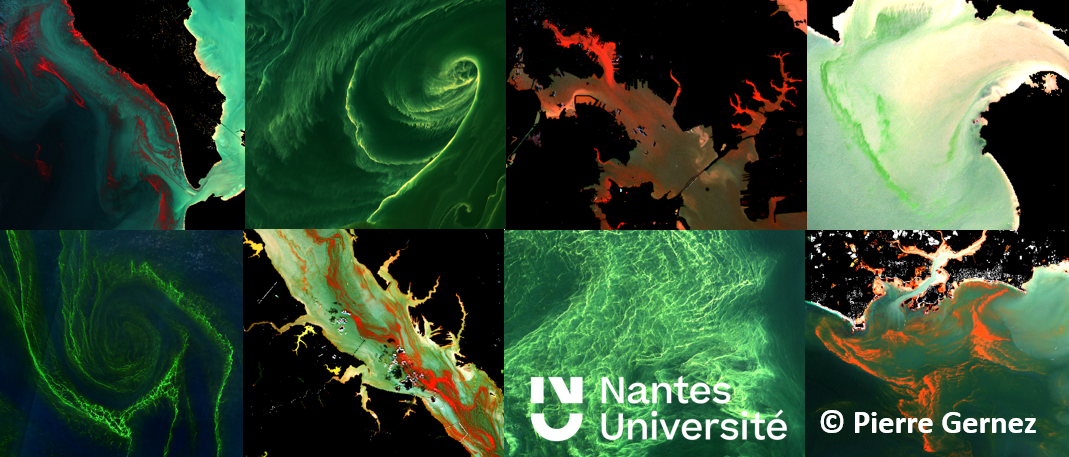
Coordonnées
Université de Nantes 2 rue de la Houssinière 44322 Nantes FRANCE
- Tél
- 0251125654 (n° interne : 455654)
- Pierre.Gernez@univ-nantes.fr
Discipline(s) enseignée(s)
- Remote Sensing, Ecology
Thèmes de recherche
- I'm part of the team Remote Sensing & Benthic Ecology, with a focus on:
- Marine Optics & Ocean Color Remote Sensing,
- EO for Coastal Ecology: Aquaculture, Biodiversity, & Harmful Algal Blooms (HABs)
Activités / CV
- PUBLICATIONS
32 Zoffoli et al 2022. Remote sensing in seagrass ecology: coupled dynamics between migratory herbivorous birds and intertidal meadows observed by satellite during four decades. Remote Sens Ecol Conservation
31 Roca et al 2022. Monitoring the marine invasive alien species Rugulopteryx okamurae using Unmanned Aerial Vehicles (UAVs) and satellites. Front Mar Sci 2088.
30 Roux et al 2022. Spatio-temporal dynamics and biogeochemical properties of green seawater discolorations caused by the marine dinoflagellate Lepidodinium chlorophorum along southern Brittany coast. Est Coast Shelf Sci 275, 107950.
29 Krupandan et al 2022. Exploring South African Pacific oyster mariculture potential through combined Earth observation and bioenergetics modelling, Aquaculture Rep 24:101155
28 Reddin et al 2022. Extensive spatial impacts of oyster reefs on an intertidal mudflat community via predator facilitation. Comm Biol 5: 250
27 Zoffoli et al 2021. Decadal increase in the ecological status of a North-Atlantic intertidal seagrass meadow observed with multi-mission satellite time-series. Eco Ind 130: 108033
26 Harmel et al 2021. Two-term Reynolds–McCormick phase function parameterization better describes light scattering by microalgae and mineral hydrosols. Optics Let 46:1860-1863.
25 Gernez et al 2021. Editorial: Remote Sensing for Aquaculture. Front Mar Sci 7:1258
24 Palmer et al 2021. Pacific oyster (Crassostrea gigas) growth modelling and indicators for offshore aquaculture in Europe under climate change uncertainty. Aquaculture 532: 736116
23 Zoffoli et al 2020. Sentinel-2 remote sensing of Zostera noltei-dominated intertidal seagrass meadows. Remote Sens Environ 251: 112020
22 Méléder et al 2020. Mapping the intertidal microphytobenthos Gross Primary Production. Part I: coupling multispectral remote sensing and physical modelling. Front Mar Sci 7: 520
21 Barillé et al. 2020. Biological, socio-economic, and administrative opportunities and challenges to moving aquaculture offshore for small French oyster-farming companies. Aquaculture 735045
20 Palmer et al 2020. Remote sensing-driven pacific oyster (Crassostrea gigas) growth modeling to inform offshore aquaculture site selection. Front Mar Sci 6:802
19 Savelli et al 2019. Impact of chronic and massive resuspension mechanisms on the microphytobenthos dynamics in a temperate intertidal mudflat. J Geophys Res 124:3752-377
18 Stramski et al 2019. Inherent optical properties and particle characteristics of the sea-surface microlayer. Prog Oceano 176:102117
17 Thomas et al 2018. Oysters as sentinels of climate variability and climate change in coastal ecosystems. Environ Res Let 13: 104009
16 Pernet et al 2018. Determination of risk factors for herpesvirus outbreak in oysters using a broad-scale spatial epidemiology framework. Sci Rep 8: 10869
15 Larnicol et al 2018. Using high-resolution airborne data to evaluate MERIS atmospheric correction and intra-pixel variability in nearshore turbid waters. Remote sens 10: 274
14 Echappé et al 2018. Satellite remote sensing reveals a positive impact of living oyster reefs on microalgal biofilm development. Biogeosci 15: 905–918
13 Gernez et al 2017. Shellfish aquaculture from space: potential of Sentinel2 to monitor tide-driven changes in turbidity, chlorophyll concentration and oyster physiological response at the scale of an oyster farm, Front Mar Sci 4: 137
12 Novoa et al 2017. Atmospheric corrections and multi-conditional algorithm for multi-sensor remote sensing of suspended particulate matter in low-to-high turbidity levels coastal waters, Remote Sens 9
11 Doxaran et al 2016. Improved correction methods for field measurements of particulate light backscattering in turbid waters, Optics Exp 24: 3615-3637
10 Le Bris et al 2016. Hyperspectral remote sensing of wild oyster reefs, Est Coast Shelf Sci 172: 1-12
9 Thomas et al 2016. Global change and climate-driven invasion of the Pacific oyster (Crassostrea gigas) along European coasts: a bioenergetics modelling approach, J Biogeography 43: 568-579
8 Gernez et al 2015. Toward Sentinel-2 high resolution remote sensing of suspended particulate matter in very turbid waters: SPOT4 (Take5) experiment in the Loire and Gironde estuaries, Remote Sens 7: 9507-9528
7 Gernez et al 2014. Remote sensing of suspended particulate matter in turbid oyster farming ecosystems, J Geophys Res, 119
6 Gernez et al 2014. Within-day variability of particulate organic carbon and remote-sensing reflectance during a bloom of Phaeocystis antarctica in the Ross Sea, Antarctica. Int J Remote Sens 35: 464-477
5 Brito et al 2013. Seasonality of microphytobenthos revealed by remote-sensing in a South European estuary, Cont Shelf Res 66: 83-91
4 Dickey et al 2012. Introduction to the special section on recent advances in the study of optical variability in the near-surface and upper ocean, J Geophys Res 117, C00H20
3 Gernez et al 2011. Vertical changes in the probability distribution of downward irradiance within the near-surface ocean under sunny conditions, J Geophys Res 116, C00H07
2 Gernez et al 2011. Diel cycles of the particulate beam attenuation coefficient under varying trophic conditions in the NW Mediterranean Sea: observations and modeling. Limnol Oceano 56: 17-36
1 Gernez & Antoine 2009. Field characterization of wave-induced underwater light field fluctuations. J Geophys Res 114, C06025
FEATURED ARTICLES

- Phytoplankton blooms
- Seagrass ecology
- Climate Change & coastal ecology
- Optics of sea surface microlayer
- EO for Aquaculture
Scholar & Researchgate
Mis à jour le 26 novembre 2024.
